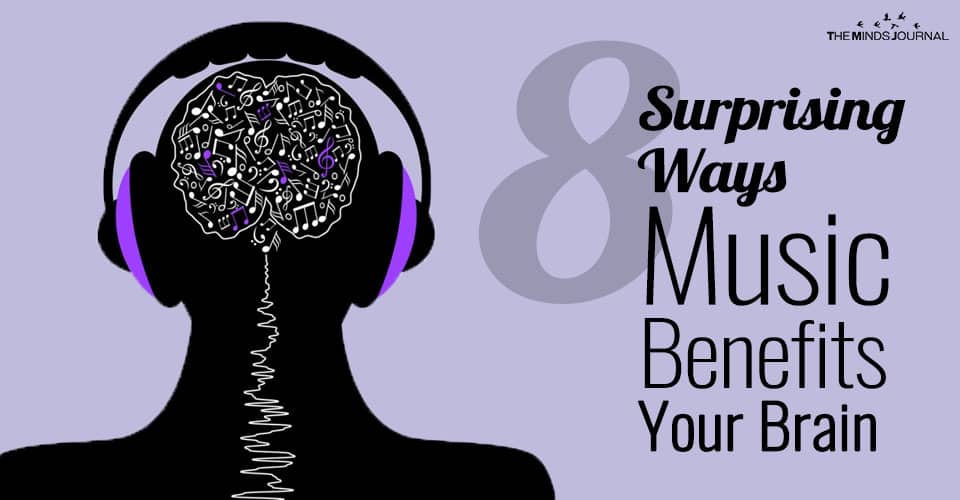Whether you are an opera lover or a fan of jazz or rap, there are surprising ways music benefits your brain.
“Music gives a soul to the universe, wings to the mind, flight to the imagination and life to everything.” ― Plato
Music is more than just pure entertainment. While it is love for some people, it’s life for others. Besides pleasure, music can influence your thoughts, deeds, actions, and feelings interestingly. Some research suggests that music can help you laugh, relax, dance, lift your mood, boost self-esteem, pump up energy levels, increase empathy and reduce pain. Read on to know.
Read on to discover how music benefits your brain and overall health.
1. Music benefits child’s emotions
Play is important for a child’s growth and development and has been emphasized by doctors, psychiatrists, psychologists and scientists time and again. But, a musical play that includes – kids exploring sounds or singing fun songs together, can amazingly influence a preschooler’s emotions.
One study showed that playing music improves a child’s school engagement, cognitive ability, and reading ability; decreases anxiety, aggression, and behavioral difficulties. Given below is the illustration of how music benefits your brain in different ways.
Another research found that playing soft, instrumental music in school or work environment can help a student in homework activities. Music can make a child better student, improve language development, test scores, and intelligence.
So, make joyful noises! Let it boost the mental health and well-being of your child and help in a successful transition to adolescence.
2. Music influences mood and performance while driving
Most people love to listen to music in the car because they want to calm their minds or deal with the stress coming from long, monotonous trips. But, little do people know that music can distract rather than enhancing their driving performance.
Barbara Millet conducted a meta-analysis of 12 experimental studies to investigate the effects of music on driving performance. Results showed a dangerous effect of music-listening on driving performance that manifested as signal violation or collisions.
Another study involving teenagers and young adults showed that drivers playing the music of their choice in the car made more mistakes than those playing the music of researchers’ choice, which was either silence or “safe” music. The results revealed that listening to unfamiliar or uninteresting music is safe for driving than no music at all.
So, next time you want to listen to your favorite radio channel or CD while driving please avoid the harmful noise levels.
Read If Music Gives You Goosebumps, Your Brain Might Be Special
3. Music induces sound sleep
Do you find it difficult to calm down and sleep at night? Then, music can help you sleep better. Various studies across the globe support the positive connection between music and sleep.
A meta-analysis of ten studies involving acute and chronic sleep disorders in adults showed that music therapy improved their quality of sleep. Similar outcomes were obtained in studies involving older adults.
In one study, patients with insomnia disorder were assigned to either experiment group that listened to music at bedtime or a control group that received no such treatment. At the end of the investigation, those in the music group showed an improvement in insomnia severity.
There is a data that suggest that listening to music could have a positive influence on the perception of sleep and quality of life in people with sleep disorders and even schizophrenia.
Are you wondering about the best bedtime music? Various reputable studies also focused on how different types of music benefits our sleep cycle. Findings indicate that soft, relaxing or instrumental music or tunes that have a rhythm of about 60 beats per minute can push you to sleep zone quickly.
4. Music benefits your brain and visual attention ability
Do you know music helps restore your impaired vision? The latest research in this area revealed that long term musical training can produce visual attention differences between musicians and non-musicians.
In a study comprising of orchestra musicians and non-musicians, the former performed better than the latter in three different visual attention ability tests. As per findings, long term musical training improves visual attention as well as stimulates other cognitive benefits.
In similar research involving stroke patients, listening to classical music significantly improved visual attention. Researchers found the worst scores when the same patients were subjected to silence or white noise.
Unlike people who did not play an instrument, musicians tend to have a larger corpus callous, the part of the brain connecting the two hemispheres.
Isn’t it mind-blowing how music benefits your brain and senses? But, there is a need for studies with a larger group of participants to validate these results.
Read How Playing a Musical Instrument Can Improve Your Brain
5. Music therapy could heal brain injury
Music acts as a healing tool after Traumatic Brain Injury (TBI), which leads to several issues with music and sound in patients. TBI impairs the executive functions of our brain such as working memory, attention control, reasoning, and problem-solving. But, certain music styles and sound patterns are known to work as brain massage.
One study examined if music therapy can improve the cognitive, sensory and motor functioning in TBI. The result showed improvement in executive functions in the first three month period of intervention and the effect was maintained in the six months follow up.
Other findings from research on how music benefits brain functions further revealed positive neuroanatomical changes in prefrontal areas (parts of the brain responsible for personality development) of participants who received music therapy.
If there are any potential rehabilitative effects of music therapy after TBI – it is not yet known. Although in the early stages of application, musical therapy has the potential to deliver wonderful and successful outcomes after brain injury.
6. Your music preference can reveal your personality
The content of your playlist can define your attitude and personality. Count on this, because the results are really fascinating!
Adrian North at Heriot-Watt University conducted a large-scale study, which revealed that liking a particular musical style or reason to listen to favourite tunes offers information about your personality factors. Here is the breakdown of different musical styles and personality traits linked to it –
- Pop music– listeners of pop hits are creative, extrovert, conventional, hardworking and have high self-esteem.
- Classical music– fans are creative, have high self-esteem and typically more introverted.
- Rap music– lovers of this music style have high self-esteem and are easy going.
- Rock/Heavy metal music– fans have low self-esteem, are gentle and often introverted.
- Jazz and Blue music– fans of this style are extrovert, creative, outgoing, gentle, and have high self-esteem.
- Dance music– fans of this genre are assertive, outgoing and open to experiences.
- Indie music– people who prefer this genre are not very hardworking and gentle but rank high on the traits of creativity and intelligence.
So, next time you add a song to your track list, remember it may reflect your personality! However, these results are from a single study without validation from other scientists.
Other researchers believe there are many other factors like cultural background and social class besides personality traits – accounting for musical preferences of a person. Experts recommend listening to various music styles for lasting effects on the brain!
Read Music Personality Test: What Your Taste In Music Says About Your Personality
7. Music can prevent overeating
Yes. You read it right! Music can help you eat less and researchers too have found friendly ties between music and eating.
In one study at Cornell University, people at less food, when the restaurant was low-lit and played jazz music. On the contrary, those who ate in restaurants with bright lights and loud music consumed more food. Also, people in the quieter dining area found the food tasty and spent more time on table than those who sat on typical fast-food like section.
In short, soft music and lights can calm your mind and help you consume fewer calories. Isn’t it the best way to curb your appetite? Relaxed setting adds to comfort, help you eat slowly and feel fuller sooner.
If you are on a mission to lose weight or want to have a healthy eating, don’t forget to play mellow music and dim lights.
8. Music acts as pain-killer
“He took his pain and turned it into something beautiful. Into something that people connect to. And that’s what good music does. It speaks to you. It changes you.” – Hannah Harrington
Music plays a beautiful role in pain management whether it’s physical or emotional pain. 266 to 360 million surgeries are performed every year, according to the World Health Organization and patients experience mild to severe pain after the operation.
Music has proven to be a safe and budget-friendly intervention for patients undergoing surgery. Research has shown that listening to music post-operation decreased the severity of pain, anxiety, and feeling of depression.
One study of end-stage liver disease patients found that music therapy reduced pain intensity by 10% and improved their satisfaction with pain management care by 30%. In some studies listening to music, pre-surgery resulted in better outcomes such as lower stress, enhanced comfort and decreased fear.
Music has a calming effect and can lessen muscle tension in patients struggling with chronic illnesses and emotional stress associated with it.
Read The Power of Beats: A Look Into the Psychological Effects of Music
Wrap up
No doubt, music has a wide range of physical, cognitive, emotional and psychological benefits and by making it part of your life, you can become happier and healthier.
What are other ways music benefits your brain? Comment and let us know!



 100vw, 512px” data-lazy-src=”https://themindsjournal.com/wp-content/uploads/2016/06/Blogpost4img.png.webp” data-lazy-srcset=”https://themindsjournal.com/wp-content/uploads/2016/06/Blogpost4img.png.webp 512w,https://themindsjournal.com/wp-content/uploads/2016/06/Blogpost4img-150×110.png.webp 150w”><noscript><img alt=)
 100vw, 600px” data-lazy-src=”https://themindsjournal.com/wp-content/uploads/2016/06/Music_benefits_brains.jpg.webp” data-lazy-srcset=”https://themindsjournal.com/wp-content/uploads/2016/06/Music_benefits_brains.jpg.webp 600w,https://themindsjournal.com/wp-content/uploads/2016/06/Music_benefits_brains-150×89.jpg.webp 150w”><noscript><img alt=)







Leave a Reply